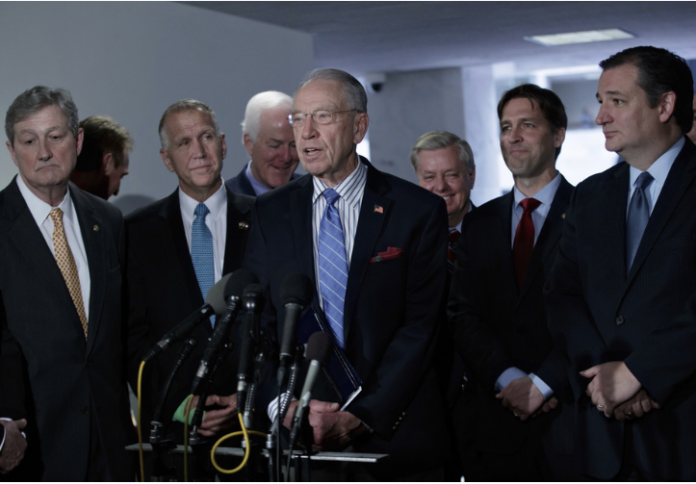

Jon Gould, American University
Soon Senate Republicans are likely to consider a “nuclear option” to put Judge Neil Gorsuch on the Supreme Court. ![]()
Just like a nuclear strike, the repercussions are likely to be wide-ranging and long-lasting. The effects will be felt not only for political relations in the Senate but also for the future of the high court and the bounds of constitutional law.
I have studied constitutional law and politics for over two decades, and this is as significant a potential turn as I can recall.
Filling the high court
As we learn in high school civics, the Constitution gives the president the power to nominate a justice to the Supreme Court and grants the Senate the right of “advice and consent” in the appointment – meaning they get to question and vote on the nominee.
To “win” appointment to the Supreme Court, a nominee needs only a simple majority, or 51 votes. Having been nominated by a Republican president, and with the Republicans holding a 52-48 majority in the Senate, Gorsuch might seem to have nothing to worry about.
But, Senate rules also allow for a “filibuster,” a parliamentary tactic that permits any one senator to hold up business unless at least 60 senators vote for “cloture,” or an end to delay. Unlike that old movie, “Mr. Smith Goes to Washington,” a senator doesn’t have to keep talking to block a vote. Simply the threat of a filibuster is enough to stall a nominee.
Filibuster and cloture are entirely creations of the Senate. In fact, cloture was not established until 1917. Originally, it required a two-thirds vote, but that has been whittled down to 60 over time.
A filibuster gives power to the minority party in the Senate to block legislation or appointments unless the majority party can round up 60 votes. In the case of Gorsuch’s nomination, if Democrats decide to filibuster – which looks likely – Republicans would have to attract eight Democratic senators to reach cloture and move forward. As of April 3, when Gorsuch’s nomination was poised to be taken up by the full Senate, only four Democrats have announced support for cloture, leaving Republicans four votes short.
The threat that Gorsuch could be blocked from the Supreme Court when he has majority support enrages Republicans, but this is not the first time the Senate has been in this situation. In the spring of 2005, when President George W. Bush was in office and Republicans had a 55-45 majority in the Senate, Republicans threatened to eliminate the filibuster to prevent the Democrats from blocking judicial appointments.
Coined the “nuclear option” because of its potential to “blow up” Senate procedures, Senate leaders would have engineered a series of procedural votes and parliamentary declarations to rule the filibuster inapplicable to judicial appointments.
The filibuster was saved that spring by a bipartisan group of senators, nicknamed the “gang of 14,” who engineered a compromise in which Democrats agreed not to filibuster judicial nominees except in “extraordinary circumstances.” However, the compromise lasted only as long as that Congress.
In 2013, with Democrats in control of the Senate and White House and Republicans holding up nominations with the filibuster, Democratic leaders in the Senate actually pulled the trigger on the nuclear option. In other words, they changed Senate rules so that nominees for executive office appointments and the lower federal courts would no longer be subject to filibusters. However, Democrats did not extend the nuclear option to legislation or nominees to the Supreme Court.
The pendulum swings
All of which brings us back to the Gorsuch nomination.
As happens often in American politics, the pendulum has swung again. Republicans find themselves in control of the Senate and White House with Democrats threatening to filibuster a nominee to the Supreme Court.
Watching senators flip-flop on the issue depending on who is in power is almost comical. Senate Republican leader Mitch McConnell was prepared to end the “abuse” of filibustering in 2005 when his party led the Senate. He then decried the Democrats “break[ing] the rules” in 2013 when they eliminated filibustering on lower court appointments. Four years later, with a Supreme Court seat at stake and Republicans in the majority, he has threatened to extend the nuclear option to all presidential nominations.
But the humor ends there, for the consequences of the nuclear option are significant.
Since the Reagan administration, appointments to the Supreme Court have become more politically fraught. People increasingly recognize the significance of a court closely split along ideological lines. Nor is the present incarnation of the nuclear option just another sign of partisan deadlock in the Senate.
The Gorsuch nomination and the threat of the nuclear option come after Republicans’ having stalled for nearly a year to consider President Obama’s nominee for the Supreme Court, Judge Merrick Garland. For all the allegations of Democrats engaging in “advise and obstruct,” it is just as plausible to say that Republicans are playing naked power politics, ensuring that they can bend the Supreme Court and the future of constitutional law to their liking.
In the Federalist Papers 78, Alexander Hamilton declared that “the complete independence of the courts of justice is peculiarly essential in a limited” constitutional government.
“There is no liberty, if the power of judging be not separated from the legislative and executive powers,” Hamilton wrote, quoting Montesquieu.
Although the Senate may not be intervening directly in the Supreme Court’s deliberations, the true threat of the nuclear option is its tolerance – indeed, its embrace – of singular partisan interests in the appointment of the judiciary. If we should mourn anything, it is that the current political climate cannot seem to produce a nominee to our highest court who can garner more than 60 votes in the Senate.
Certainly, this is a problem now, as a known conservative judge, Gorsuch, is set to replace a former conservative on the court, Justice Antonin Scalia. But, should one of the “liberal” justices – the 84-year-old Ruth Bader Ginsburg or the 78-year-old Stephen Breyer – step down under current circumstances, all bets are off for the future of the Supreme Court and the legitimacy of Senate confirmation.
Jon Gould, Professor of Public Affairs and Law, American University
This article was originally published on The Conversation. Read the original article.



















